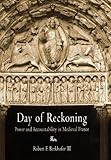Day of Reckoning : Power and Accountability in Medieval France / Robert F. Berkhofer III.
Material type: TextSeries: The Middle Ages SeriesPublisher: Philadelphia : University of Pennsylvania Press, [2013]Copyright date: ©2004Description: 1 online resource (280 p.)Content type:
TextSeries: The Middle Ages SeriesPublisher: Philadelphia : University of Pennsylvania Press, [2013]Copyright date: ©2004Description: 1 online resource (280 p.)Content type: - 9780812237962
- 9780812201260
- 944/.02 22
- DC83 .B47 2004eb
- online - DeGruyter
- Issued also in print.
| Item type | Current library | Call number | URL | Status | Notes | Barcode | |
|---|---|---|---|---|---|---|---|
 eBook
eBook
|
Biblioteca "Angelicum" Pont. Univ. S.Tommaso d'Aquino Nuvola online | online - DeGruyter (Browse shelf(Opens below)) | Online access | Not for loan (Accesso limitato) | Accesso per gli utenti autorizzati / Access for authorized users | (dgr)9780812201260 |
Browsing Biblioteca "Angelicum" Pont. Univ. S.Tommaso d'Aquino shelves, Shelving location: Nuvola online Close shelf browser (Hides shelf browser)

|

|

|

|

|

|

|
||
| online - DeGruyter Selling the American Way : U.S. Propaganda and the Cold War / | online - DeGruyter Frantic Panoramas : American Literature and Mass Culture, 187-192 / | online - DeGruyter Witchcraft and Magic : Contemporary North America / | online - DeGruyter Day of Reckoning : Power and Accountability in Medieval France / | online - DeGruyter The Typological Imaginary : Circumcision, Technology, History / | online - DeGruyter Kinesics and Context : Essays on Body Motion Communication / | online - DeGruyter Creating East and West : Renaissance Humanists and the Ottoman Turks / |
Frontmatter -- Contents -- Introduction -- 1. A Fragmentary Past? Monastic History, Memory, and Patrimony -- 2. Written Comprehension of Land and Signs of an Administrative Mentality -- 3. Ministering and Administering: Abbots as Catalysts of Change -- 4. Discipline and Service Inside and Outside the Cloister -- Conclusion: Accountability, Writing, and Rule by 1200 -- Appendix A: The Cartularies of Saint-Bertin -- Appendix B: The Cartulary of Three Crosses -- Appendix D: Abbatial and Monastic Acts: Saint-Vaast, Saint-Bertin, and Saint-Denis -- Abbreviations -- Notes -- Bibliography -- Index -- Acknowledgments
restricted access online access with authorization star
http://purl.org/coar/access_right/c_16ec
Day of Reckoning: Power and Accountability in Medieval France applies recent approaches to literacy, legal studies, memory, ritual, and the manorial economy to reexamine the transformation of medieval power. Highlighting the relationship of archives and power, it draws on the rich documentary sources of five of the largest Benedictine monasteries in northern France and Flanders, with comparisons to others, over a period of nearly four centuries. The book opens up new perspectives on important problems of power, in particular the idea and practice of accountability. In a violent society, medieval lords tried to delegate power rather than share it-to get their men to prosecute justice or raise money legitimately, rather than through extortion and pillage. Robert F. Berkhofer III explains how subordinates were held accountable by abbots administering the extensive holdings of Saint-Bertin, Saint-Denis, Saint-Germain-des-Prés, Saint-Père-de-Chartres, and Saint-Vaast-d'Arras. As the abbots began to discipline their agents and monitor their conduct, the "day of reckoning" took on new meaning, as customary meeting days were used to hold agents accountable. By 1200, written and unwritten techniques of rule developed in the monasteries had moved into the secular world; in these practices lay the origins of administration, bureaucratic power, and governance, all hallmarks of the modern state.
Issued also in print.
Mode of access: Internet via World Wide Web.
In English.
Description based on online resource; title from PDF title page (publisher's Web site, viewed 24. Apr 2022)


